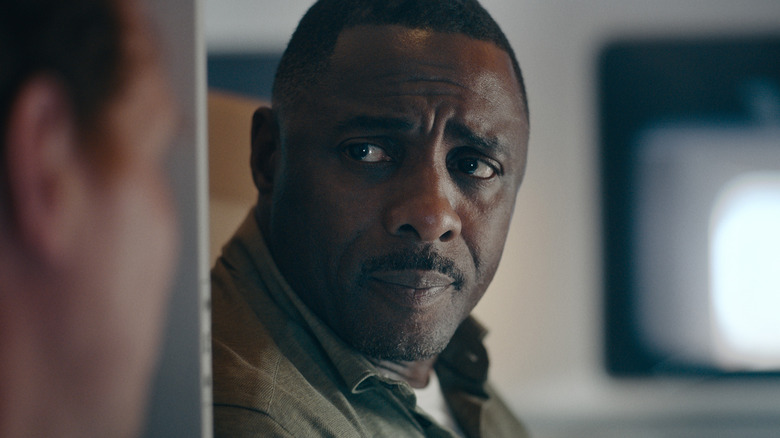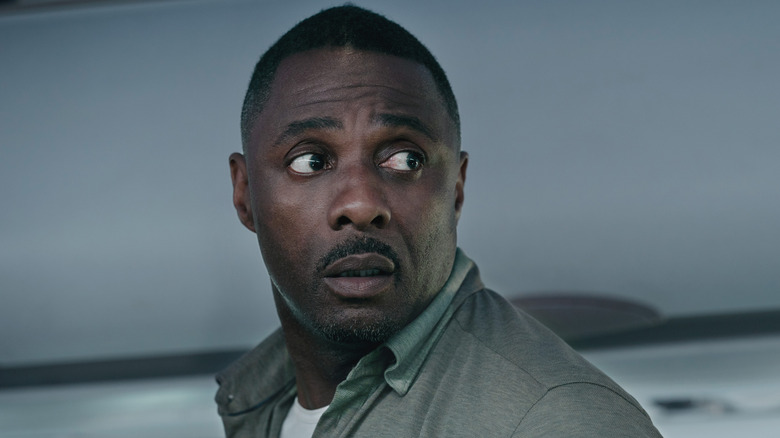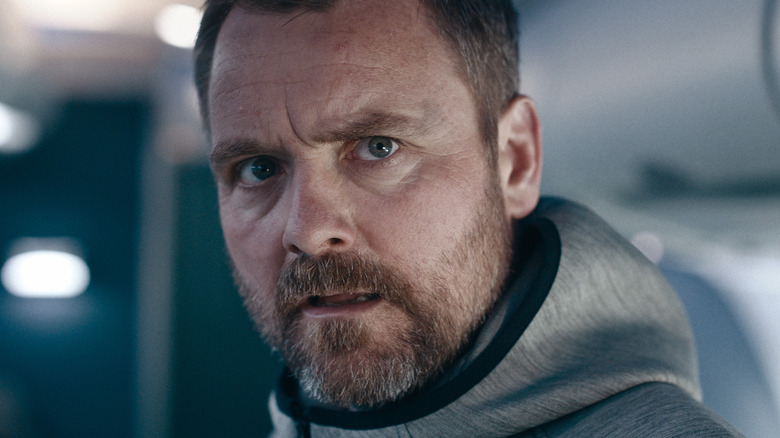Hijack: Idris Elba's Everyman Hero Is Exactly What Blockbuster Cinema Must Reclaim
Contains spoilers for the first two episodes of "Hijack."
Some of Idris Elba's best roles are characters that can't be stopped. John Luther, the unarmed lawman and loose cannon, has — since his inception — been relentless, fueled by rage, and essentially become the rage-fueled James Bond everyone always wanted to see Elba play. In "The Suicide Squad," Elba's regular human certainly feels superhuman, considering the pistol-packing Bloodsport's whole reputations rests on challenging Superman. You get the point: Elba characters tend to be OP.
Thanks to the Apple TV+ series "Hijack," that's all about to change. In the seven-part series that spans a flight from Dubai to London, Elba is Sam Nelson, a divorced father heading home only for his trip to hit a snag when armed, dangerous hijackers take it over, with an agenda that has yet to be revealed. The show places Elba in the sort of role that we've not seen him tackle in years, and by doing so, it establishes not just one of the best performances in his career, but also, a new model for why action thrillers need to reclaim their oldest trope — the reserved everyman with nothing to gain and everything to lose.
Hijack's real-life threat elevates Elba's first-class hero
In the current climate of mainstream entertainment, heroes are either gung-ho henchman decimators or dimension-saving superheroes. Elba's done plenty of those roles, by now. "Hijack," on the other hand, puts him in an environment that we rarely see day-savers in. He's a genuine everyman, way out of his depth. He's not a U.S. Marshall or an ex-specially trained operative. He's a business negotiator, making him, according to his ex-wife, Marsha (Christine Adams), "The best at handling it" — but in a relatable way.
This alone humanizes Elba's character, and it's also great to see how his communication skills allow him to connect with both sides of the aircraft aisle. Compared to John Luther — in this setting, the perennially on-edge detective would be shouting the enemy down — Sam is a cool customer, and he has things figured out in the first episode even before some hijackers do.
But as bright as our savior might be, he isn't a selfless cliched hero. Sam isn't a messianic figure. He throws himself into the mix to ensure he gets home — and nothing else. He's Cameron Poe of "Con Air," but not a deadly weapon. But by harkening back to past heroes with successful and popular tropes, "Hijack" clearly indicates that this is the secret ingredient that has been missing from blockbusters for too long.
Hollywood needs to follow Hijack's flight plan, and bring back everyman heroes
The everyman hero has been missing from screens for ages. If we consider our contemporary barebones blockbuster heroes, it's a dwindling market that only Liam Neeson and Gerard Butler monopolize. As for the rest of the Hollywood stars prone to narrowly escape an explosion, most do so on either (1) a world slightly off-kilter from reality, or (2) in a colorful costume. "Hijack" is a solid reminder that grounded reality can be great, and if Idris Elba can do it, so can similarly charismatic stars.
In a series evoking the likes of Kurt Russel in "Executive Decision," Will Smith in "Enemy of the State," as well as flecks of Nicolas Cage in "The Rock," it's easy to argue that "Hijack" proves that tried and tested formulas from the '80s and '90s still work. Such stories are not asking for Oscar-worthy performances, but simply the kind of movie star magnetism that we're missing from most movies and TV shows these days. Which isn't to say that such narratives are one-man shows. In "Hijack," Elba's opposite is the always impressive Neil Maskell as the head of the operation, and it's the dynamic between them that hooks us. Meanwhile, "Hijack" also makes a conscious effort to flesh out its supporting cast, such as ATC worker Alice (Eve Myles), and Detective Daniel O' Farrel (Max Beesley), the new beau of Sam's ex-wife.
"Hijack" proves that what Hollywood's blockbuster landscape needs is realistic tension, more reminiscent of "Phone Booth" than "Superhero of the Semi-Colon: Vol. 27." In the end, watching A-listers sweating in tight spaces and timeline constraints is always worth the cost of the ticket.


